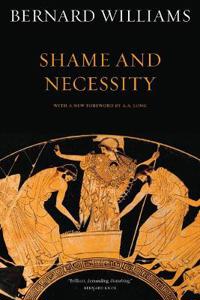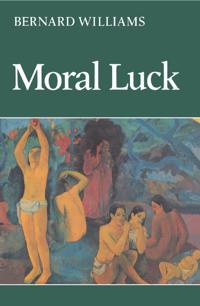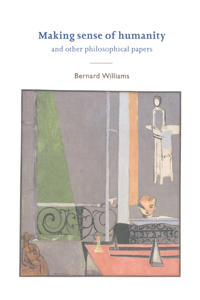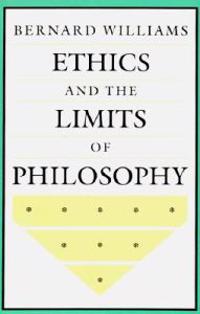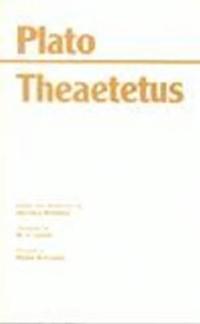Shame and Necessity (Pocket)
avBernard Williams, A. A. Long, Bernard Williams
ISBN: 9780520256439 - UTGIVEN: 200804We tend to suppose that the ancient Greeks had primitive ideas of the self, of responsibility, freedom, and shame, and that now humanity has advanced from these to a more refined moral consciousness. Bernard Williams' original and radical book questions this picture of Western history. While we are [...]
Ethics and the Limits of Philosophy (Storpocket)
avBernard Williams
ISBN: 9780415610148 - UTGIVEN: 201104With a new foreword by Jonathan Lear 'Remarkably lively and enjoyable...It is a very rich book, containing excellent descriptions of a variety of moral theories, and innumerable and often witty observations on topics encountered on the way.' - Times Literary Supplement Bernard Williams was one of th[...]
Reading Bernard Williams
ISBN: 9780415771900 - UTGIVEN: 2009-01When Bernard Williams died in 2003, the Times newspaper hailed him 'as the greatest moral philosopher of his generation'. This outstanding collection of specially commissioned new essays on Williams's work is essential reading for anyone interested in Williams, ethics and moral philosophy and philos[...]
Moral Luck (Inbunden)
avBernard Williams
ISBN: 9780521243728 - UTGIVEN: 1981-12A new volume of philosophical essays by Bernard Williams. The book is a successor to Problems of the Self, but whereas that volume dealt mainly with questions of personal identity, Moral Luck centres on questions of moral philosophy and the theory of rational action. That whole area has of course be[...]
Moral Luck (Häftad)
avBernard Williams
ISBN: 9780521286916 - UTGIVEN: 198112A new volume of philosophical essays by Bernard Williams. The book is a successor to Problems of the Self, but whereas that volume dealt mainly with questions of personal identity, Moral Luck centres on questions of moral philosophy and the theory of rational action. That whole area has of course be[...]
Problems of the Self (Häftad)
avBernard Williams
ISBN: 9780521290609 - UTGIVEN: 197603A volume of philosophical studies, centred on problems of personal identity and extending to related topics in the philosophy of mind and moral philosophy.[...]
Making Sense of Humanity (Häftad)
avBernard Williams
ISBN: 9780521478687 - UTGIVEN: 199506This new volume of philosophical papers by Bernard Williams is divided into three sections: the first Action, Freedom, Responsibility, the second Philosophy, Evolution and the Human Sciences; in which appears the essay which gives the collection its title; and the third Ethics, which contains essays[...]
Bernard Williams (Pocket)
avAlan (EDT) Thomas
ISBN: 9780521665551 - UTGIVEN: 2007-09This volume provides a systematic overview and comprehensive assessment of Bernard Williams' contribution to moral philosophy, a field in which Williams was one of the most influential of contemporary philosophers. The seven essays, which were specially commissioned for this volume, examine his work[...]
Ethics and the Limits of Philosophy (Häftad)
avBernard Williams
ISBN: 9780674268586 - UTGIVEN: 1986-03In this book Bernard Williams delivers a sustained indictment of moral theory from Kant onward. His goal is nothing less than to reorient ethics toward the individual. He deals with the most thorny questions in contemporary philosophy and offers new ideas about issues such as relativism, objectivity[...]
Truth And Truthfulness (Pocket)
avBernard Williams
ISBN: 9780691117911 - UTGIVEN: 2004-02-02Explores the value of truth and finds it to be both less and more than we might imagine. This book identifies two basic virtues of truth, accuracy and sincerity. It describes different psychological and social forms that these virtues have taken and asks what ideas can make best sense of them.[...]
The Sense of the Past (Häftad)
avBernard Williams
ISBN: 9780691134086 - UTGIVEN: 2007-12Before his death in 2003, Bernard Williams planned to publish a collection of historical essays, focusing primarily on the ancient world. This posthumous volume brings together a much wider selection, written over some forty years. His legacy lives on in this masterful work, the first collection eve[...]
Philosophy as a Humanistic Discipline (Häftad)
avBernard Williams
ISBN: 9780691134093 - UTGIVEN: 200801What can - and what can't - philosophy do? What are its ethical risks - and its possible rewards? How does it differ from science? In "Philosophy as a Humanistic Discipline", Bernard Williams addresses these questions and presents a striking vision of philosophy as fundamentally different from scien[...]
Morality (Häftad)
avBernard Williams
ISBN: 9781107604766 - UTGIVEN: 201203In Morality Bernard Williams confronts the problems of writing moral philosophy and offers a stimulating alternative to more systematic accounts which seem nevertheless to have left all the important issues somewhere off the page. Williams explains, analyses and distinguishes a number of key positio[...]
GCSE Citizenship Studies: Student Book (Pocket)
avDavid Coulson-Lowes, Bernard Williams
ISBN: 9781843032878 - UTGIVEN: 2002-10-11Bernard Williams
ISBN: 9781902683959 - UTGIVEN: 2006-07From his earliest work on personal identity to his last on the value of truthfulness, the ideas and arguments of Bernard Williams - in the metaphysics of personhood, in the history of philosophy, but especially in ethics and moral psychology - have proved sometimes controversial, often influential, [...]
Bernard Williams (häftad)
ISBN: 9781902683966 - UTGIVEN: 2006-07From his earliest work on personal identity to his last on the value of truthfulness, the ideas and arguments of Bernard Williams - in the metaphysics of personhood, in the history of philosophy, but especially in ethics and moral psychology - have proved sometimes controversial, often influential, [...]
Utilitarianism (Pocket)
avJ. J. C. Smart, Bernard Arthur Owen Williams, J. J. C. Smart
ISBN: 9780521098229 - UTGIVEN: 197311Two essays on utilitarianism, written from opposite points of view, by J. J. C. Smart and Bernard Williams. In the first part of the book Professor Smart advocates a modern and sophisticated version of classical utilitarianism; he tries to formulate a consistent and persuasive elaboration of the doc[...]
Theaetetus (Inbunden)
avPlato, Bernard (EDT) Williams, M. J. (TRN) Levett
ISBN: 9780872201590 - UTGIVEN: 1992-11M J Levett's elegant translation of "Theaetetus", first published in 1928, is here revised by Myles Burnyeat to reflect contemporary standards of accuracy while retainingn the style, imagery, and idiomatic speech for which the Levett translation is unparalleled. Bernard Williams' concise introductio[...]
AQA Expressive Arts GCSE: Student's Book (Pocket)
avBernard Fallon, June Williams, Anette Stucker, Trudi Dyer, Keith Woolfenden
ISBN: 9781408505519 - UTGIVEN: 2009-11-23

